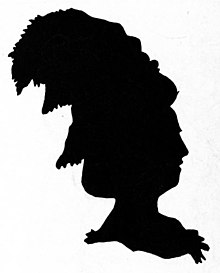Lovisa Augusti
Lovisa Sofia Augusti , originally Ester Salomon (* 1751 or 1756 ; † June 25, 1790 in Stockholm ) was a Swedish opera singer with a soprano voice . She was considered an important singer of the era of Gustav III. She was Hovsångare (court singer) from 1773 and was appointed to the Royal Swedish Music Academy in 1788 .
life and work
Ester Salomon was the daughter of a Jewish traveling musician. She was baptized for the Annunciation in 1767 and was given the new first names Lovisa and Sofia. It is not known when she married the violinist Frederik Augusti. Her husband was committed to the royal court orchestra.
Her voice was discovered by King Gustav III. from Sweden personally. He heard her sing in Kristianstad and made sure that she was hired at his newly founded theater in Stockholm, the Royal Theater in Stora Bollhuset , where opera, ballet and spoken theater were given from January 1773. Her first appearance on November 25, 1773 was Apollo in the prologue of Orpheus and Eurydice and was received extremely well. One avid admirer wrote:
- Ah! que d'appas; déesse ou dieu!
- ainsi l'on t'admire en tout lieu.
- Qui voit tes traits, les considère,
- de l'Amour apperçoit la mère;
- qui de ta voix entend le son,
- trouve en Venus and Apollo.
In the translation, the short hymn ends with the exclamation: Whoever hears your voice / recognizes Apollo in Venus . On the occasion of the festivities for a wedding at court, Silvie was performed for the first time on July 13, 1774 , a three-act opera with prologue based on the textbook by the French playwright Pierre Laujon , set to music by Pierre-Montan Berton and Jean-Claude Trial . The translation was done by Court Marshal Baron Manderström. Lovisa Augusti sang the role of Astrild. On April 24, 1775 she took over the title role in Aeglé , an opera ballet by Laujon with music by various masters.
On January 26, 1778, the king's name day, the amphion was given for the first time , based on a text by Gudmund Jöran Adlerbeth , set to music by Johann Gottlieb Naumann . In the prologue to this work, she represented the rarity and aroused favor with the royal family. In recognition of the Queen for her acting and singing performance, she received a golden box with a gorgeous homage in it. She achieved further success as Love in Adonis and in the title role of Lucile . Since the court singer Elisabeth Olin (1740–1828) often fell ill, Augustine was able to take over her roles several times. She was especially celebrated in the role of Euridice. At the world premiere of Gustaf Wasa she gave Anna Bielke and in Gustaf Adolf and Ebba Brahe she sang Märta.
In 1788 she was appointed to the Royal Swedish Music Academy . She died at a young age. Fourteen days after her death, Nils von Rosenstein mourned in a letter to Gustav III. the "real loss".
literature
- Carin Österberg, Inga Lewenhaupt, Anna Greta Wahlberg: Svenska kvinnor: föregångare nyskapare , Signum 1990, ISBN 91-87896-03-6
Web links
- Lovisa Sofia Augusti in Svenskt kvinnobiografiskt lexikon by Eva Helen Ulvros (English)
- Nordisk familjebok , 1332, short biography (Swedish)
Individual evidence
- ^ Christoph Wilhelm Lüdeke : General Swedish erudition archives under Gustafs of the Third Government , Third Part, Leipzig: JF Junius 1785, p. 42
- ^ Christoph Wilhelm Lüdeke: General Swedish erudition archives under Gustafs of the Third Government , Third Part, Leipzig: JF Junius 1785, p. 43
- ↑ Christoph Wilhelm Lüdeke: General Swedish learning archive under Gustafs of the Third Government , Third Part, Leipzig: JF Junius 1785, p. 199f
| personal data | |
|---|---|
| SURNAME | Augusti, Lovisa |
| ALTERNATIVE NAMES | = Augusti, Lovisa Sofia; Salomon, Ester (maiden name) |
| BRIEF DESCRIPTION | Swedish opera singer (soprano) |
| DATE OF BIRTH | 1751 or 1756 |
| DATE OF DEATH | June 25, 1790 |
| Place of death | Stockholm |
